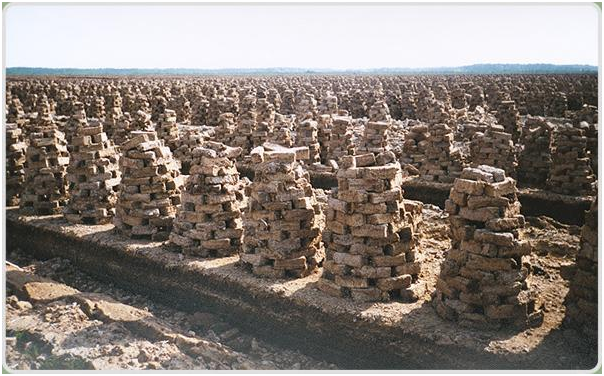In our quest to educate our readers on alternate forms of energy which one day can solve most of our energy crisis, we bring across a lesser known form of natural fuel-Peat. Peat is a collective term for natural vegetation which has been incompletely decomposed into the soil and remains as a layer above the soil. It usually forms in wetlands where the insufficient oxygen does not allow a complete disintegration of the natural vegetation. Peat is used a fuel in some parts of the world where it’s densely available. It consists of partially decayed shrubs, lichens and other form of weeds which form a solid mass after accumulating water. It’s considered as a fossil fuel as peat deposits are not renewable in the same ratio as they are being consumed.

An estimated 3% of the land area in the world is said to be covered with different forms of peat, which can yield about 8 Billion Tera joules of energy. Large peat deposits are found in Europe, North America, New Zealand and Russia. Under some conditions, peat slowly turns into lignite coal over a period of time. However, it takes about a year for a single millimeter of peat deposit to accumulate above the soil.
In some countries such as Ireland and England, Peat is converted into a fuel after drying. This fuel is used for cooking and for domestic heating. Peat briquettes are also sold in some parts of Ireland and are also used in power generation. Refined peat is also added to the soil to improve its moisture retention abilities. Energy from using peat as a fuel accounts for about 6.2% of Finland’s annual energy production
However, Peat generates more carbon dioxide than coal and its use is also limited to areas where it’s freely available when compared to other sources of fuel.
Russia has been traditionally using peat as an energy source and now accounts for about 17% of the world’s peat production out of which 20% is used to generate power. The Shatura power station is one of the largest peat powered power station where 11% of the fuel used comes from peat.
Peat deposits rarely tend to catch fire causing widespread damage to the local environment. A massive peat deposit caught fire in Russia in 2010 due to a heat wave causing widespread destruction of habitation apart from releasing a thick smoke blanket of gases over Moscow.

